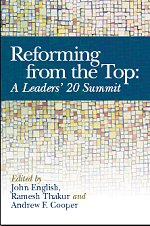| UNU Home UNUP Home Publications Staff Feedback Search Contacts Disclaimer | ||
|
Reforming from the Top: A Leaders' 20 Summit
Edited by John English, Ramesh Thakur and Andrew F. Cooper |

|
| ||||||||||||||||||
| |||||||||||||||||||
Description
The system of global governance is under serious challenge. The UN, the G7/8, the IMF and the World Bank are but a handful of the organizations contributing to what has become a crisis of legitimacy for an international system that appears ill-suited for timely, innovative and effective solutions to contemporary global challenges. Moreover, it is a system that made sense mainly for the post-Second World War era, but sixty years later seems ill-equipped for bridging the growing political and economic divides between North and South and accommodating the needs of the big, emergent markets.
Some scholars and practitioners have suggested that the time has come for the establishment of new multilateral forums that reflect 21st century realities. One option attracting increased attention in policy and academic circles is to create a Summit of the leaders of 20 nations (L20), an institution that draws its inspiration from both the current G7/8 leaders' meetings and the G20 finance ministers' meetings.
This book explores whether the creation of an L20 is a feasible possibility for the international community. It offers thematic and geographic arguments in favour of the L20, with a particular emphasis on the larger role that it could play in bringing about reform of the global economic and financial systems. The book concludes with a discussion of the changing nature of relationships in a globalised world, and makes a case for why an L20 would be a worthwhile addition to the international architecture.
John English is Executive Director of the Centre for International Governance Innovation (CIGI), Waterloo, Canada.
Editors
John English is Executive Director of the Centre for International Governance Innovation (CIGI), Waterloo, Canada. Ramesh Thakur is Senior Vice-Rector of the United Nations University (Assistant Secretary-General, United Nations), Tokyo, Japan.
Andrew F. Cooper is Associate Director of the Centre for International Governance Innovation (CIGI), Waterloo, Canada.
 UNU home
UNU home